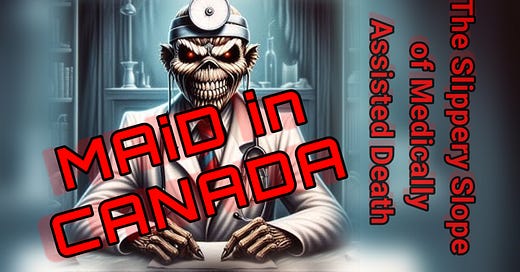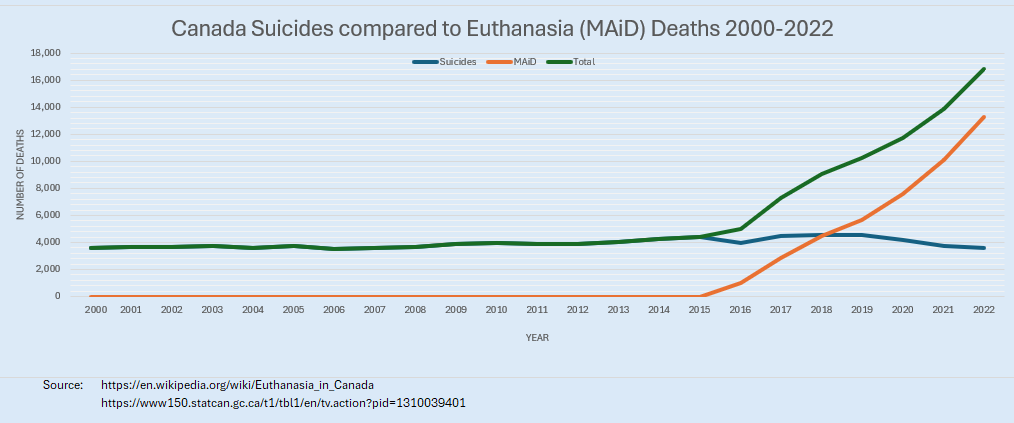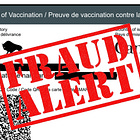MAiD in Canada - The Slippery Slope of Medically Assisted Death
Part 3 of the Slippery Slope series.
As I mentioned in Part 1 of The Slippery Slope series, The Slippery Slope of Safer Supply (try saying that one five times fast), the loudest message from certain segments of society regarding slippery slopes is that they don’t really exist, and if you say they do, you’re just a fear-monger with not enough issues in your life to complain about.
And do check out Part 2, the Slippery Trans Slope with the rather cumbersome headline Even the Trans Takeover of a Women's Rape Centre Doesn't Mean We've Hit Bottom Yet when you're done reading this.
I'm well aware that the term slippery slope is considered to be a logical fallacy (a fancy way of saying it doesn't really exist) but I'm using it anyway because it's a term that everyone understands to mean something that is out of control. So regardless of how you wish to analyze my choice of words, what we've seen over the last eight years or so is a project with questionable goals, sketchy reasoning, and shady backroom dealings that really does seem out of control compared to the way every other country has implemented similar regimes.
Finally a huge win for the Trudeau Liberals
I've been fond of saying that the current Liberal government under the direction of Justin Trudeau is a testament of failure after failure, that almost nothing they have attempted has worked, and that it's apparent to everyone but them. Recent information now has me questioning that claim.
This information being that Canada is now the global leader in the killing of its own citizens - a resounding victory for the Trudeau Liberals. The Medical Assistance in Dying bill (MAiD) was one of the government’s main priorities right out of the gate. It was presented with much pomp and ceremony within a year of Trudeau's election.
A key component of the bill is that it would restrict euthanasia only to mentally competent adults with "enduring and intolerable suffering" and in cases where death is reasonably foreseeable. That's how it was sold, anyway.
Here's the timeline of how it really went down:
2016: To be eligible for MAiD, you had to be 18 or older, mentally competent, suffering from a serious physical health condition, in an advanced state of decline, and someone whose natural death was “reasonably foreseeable”.
The first year (2016) saw 1,018 individuals take advantage of the program. In 2017 (the first full year) those numbers more than doubled, and in 2018 they rose by an additional 36%.
2019: deaths continue to rise by over 20% and the Superior Court of Quebec declared that restricting euthanasia to those whose death is reasonably foreseeable violated the Charter's guarantee to “life, liberty, and security of the person” as well as the Charter's guarantee of “equal protection” under the law. The ruling declared the reasonably foreseeable clause in the federal euthanasia legislation to be unconstitutional.
It’s quite the legal accomplishment that the failure to include enough people in the “right to die” column ended up going against our charter’s guarantee of life, liberty, and security, as well as the equal protection law. Never saw that one coming. If there's a better example of us needing protection from our own laws, I haven't seen it.
2020: MAiD deaths continue to rise by a little over 25% to 7,603 individuals.
2021: MAiD deaths increase by another 24%. New legislation relaxed or eliminated some of the safeguards for patients whose deaths were reasonably foreseeable, notably removing the 10-day waiting period, requiring only a single independent witness, and removing the requirement to offer palliative care. The legislation also introduced a new avenue (called Track 2) for those whose death was not reasonably foreseeable.
2022: MAiD deaths continue to increase by another 24%.
2023: MAiD deaths continue to increase, but only by about 14%. Parliament’s joint MAiD committee begins assessing Canada's readiness for opening up assisted suicide to people who suffer solely from mental disorders. For context, in Canada, 20% of citizens are impacted by mental health challenges.
Early in 2023, it was decided to delay this provision until March of 2027, though this is now being challenged in court on the basis of (yup, you guessed it) the charter’s guarantee of life, liberty, and security, as well as the equal protection law.
January, 2024: Canada’s medically assisted deaths outpace every other country in the world. Canada will soon hold the title as the world leader in government assisted suicides.
Below is a chart of the top ten leading causes of death in Canada from Statistics Canada. Actually, I had to alter it a little bit because although they do include deaths by suicide in their data, they don't include deaths by government assisted suicide. I guess it's not really that big of a number so it probably doesn't matter anyway, right? Wrong.
It’s hard to believe, but medically assisted death ranks as the 4th leading cause of death in Canada. That means more people die by MAiD than by strokes, chronic lower respiratory disease, diabetes, and Alzheimer’s.
Remember that thing that happened back in 2020? That pandemonium caused by a little thing called covid-19? Well, as of the end of 2023, there have been more Canadians killed by MAiD than by Covid-19. Where's the emergency response to that one?
You know what else hasn't killed quite as many people as this government program? The opioid crisis. Since 2016 (the same year MAiD was introduced coincidentally) over 44,000 opioid related deaths have be recorded. This is a subsection of the #3 spot, Accidents and unintentional injuries which includes poisoning and alcohol and drug deaths.
The government obviously keeps track of MAiD deaths, but the fact that they aren’t included in the leading causes of death data seems a little bit odd to me, especially when they're the 4th leading choose of death in the country.
One interesting thing about this chart is the number of suicides, which has been in steady decline since the advent of MAiD. The following chart shows that the number of suicides had remained basically flat at least since 2000, but when MAiD was introduced, they began to drop ever so slightly. If that’s all the information we had, one might almost be thankful for that. Sadly, when taken together, MAiD deaths plus suicides brings the current total number of people purposely ending their own lives to more than four times what it had been for at least the previous 16 years.
Dr. Sonu Gaind is chief of psychiatry at Sunnybrook Hospital in Toronto. Here’s his take, and evidently he’s not necessarily convinced it’s a slippery slope - he thinks it’s worse:
We’ve gone in a trajectory that no other country on the planet has gone. We don’t know what the full impact is going to be. There hasn’t been a slippery slope. We’ve had a cliff. We’re falling off it … I’m concerned about what it says about our society.
From The Canadian Association of MAiD Assessors and Providers (CAMAP), emphasis mine:
There is no provision in the law that prohibits healthcare professionals from initiating a discussion about MAiD or responding to questions about MAiD from a patient. All healthcare professionals have a professional obligation to respond to questions about MAiD from patients.
Holding a conscientious objection to MAiD does not negate these obligations. Rather, it activates alternative duties to discuss the objection with the patient and to refer or transfer the care of the patient to a non-objecting clinician.
In other words, the way this is set up it really doesn’t matter how many doctors are uneasy about MAiD, or even if most of them are because eventually the patient will have to be referred to a doctor that is completely comfortable with it.
The above 15 page document from CAMAP repeatedly refers to MAiD as a care option, and a treatment option. And by “repeatedly” I mean over a dozen times each. It also assures us that MAiD is merely just one of the “medically effective and legally available” options for patients.
Dr. Scott Kim at the National Institutes of Health calls MAiD an ideology - “one shared by no other jurisdiction in the world,” and he seems to imply that it is in fact a slippery slope. According to Kim:
It is difficult to overemphasize how radical this position is.
Unless its spell is broken, it is difficult to see how a further deepening of the crisis can be avoided, for no set of “safeguards” born from the ideology will be able to protect the society’s most vulnerable from the “helping hand” of medicine.
In an expert witness testimony before the Canadian Senate Committee on Legal and Constitutional Affairs in 2020, Dr. Kim testified that:
The aggressive philosophy of implementation, in coordination with advocacy groups rather than wide input from varying perspectives, has been truly astonishing.
He also noted that discussions as to how to implement this program have largely taken place “behind closed doors where physicians and lawyers appointed by the government pushed hard for broad accessibility to assisted death for Canadians.”
On the bright side, the Medical Assistance in Dying regime stands to save us millions of dollars on our health-care budget. According to this 2017 study in the Canadian Medical Association Journal:
Medical assistance in dying could reduce annual health care spending across Canada by between $34.7 million and $138.8 million, exceeding the $1.5–$14.8 million in direct costs associated with its implementation.
Another potential bright spot that MAiD advocates like to crow about is the fact Canada now performs more organ transplants from MAiD donors than any other country in the world. Again, not sure if this is something to be proud of, or terrified of.
I suppose this could be considered welcome news in light of the other more negative news articles that have been coming out. I mean, these kinds of headlines definitely sound a lot better than these:
RCMP called to investigate multiple cases of veterans being offered medically assisted death
Veterans Affairs Canada tried to hide euthanasia scandal paper trail
Canadians with nonterminal conditions sought assisted dying for social reasons
Or this juicy one:
Family files lawsuit after man received MAID while out on psychiatric ward day pass
Whether you believe in slippery slopes or not, it's pretty obvious that something is rotten in the great white north. This is truly a MAiD in Canada problem (sorry, not sorry for the pun) and it's going to require a made in Canada solution. By now it's evident that the current administration is either incapable or unwilling to provide such a solution so we'll have to wait until election day and hope for the best.
Just in case you were wondering, 2016 was the year the first “safer supply” site opened in Canada (Slippery Slope #1), as well as the year of the infamous pronoun scandal that got Jordan Peterson booted from the University of Toronto (Slippery Slope #2), and it was also the year MAiD was introduced in Canada. And in the off chance you need reminding, 2016 was also the year after Justin Trudeau took up residence in Ottawa as our Prime Minister. It's really no coincidence that we as a nation began our descent down all three of these slippery slopes in the same year and all three were huge priorities for Trudeau's government.
After this week's resignation of our deputy Prime Minister, it seems the most worthy candidate for euthanasia in this country may well the Liberal Party of Canada itself. The real silver lining there would be that putting them out of their misery would go a long way to relieving the misery of the majority of Canadians as well. Now that would really be great way to reduce spending.












This Just In: "It's the Canadian way, eh?"
https://babylonbee.com/news/trudeau-to-be-humanely-euthanized